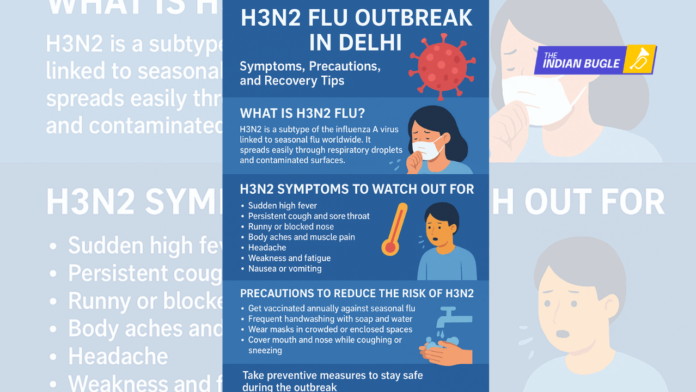Delhi is currently battling an outbreak of H3N2 influenza, a subtype of influenza A virus linked to seasonal flu worldwide. While it may appear mild at first, H3N2 tends to mutate quickly, making it more challenging to manage than other flu strains.
The virus spreads easily through respiratory droplets when an infected person coughs, sneezes, or talks. It is also fomite-borne, meaning it can spread indirectly through contaminated surfaces such as doorknobs, handles, or shared objects.
H3N2 Symptoms to Watch Out For
Symptoms usually appear 1–4 days after exposure and may worsen if left untreated. Common signs include:
- Sudden high fever
- Persistent cough and sore throat
- Runny or blocked nose
- Body aches and muscle pain
- Headache, weakness, and fatigue
- Nausea or vomiting (more common in children)
In severe cases, H3N2 can lead to complications like pneumonia, especially in older adults, children, and pregnant women.
Recovery Time
Most healthy individuals recover from H3N2 within 1–2 weeks with rest, hydration, and over-the-counter medicines for fever and body pain. However, doctors advise seeking medical help if symptoms persist beyond five days or worsen.
Antiviral medications, when prescribed, are most effective if taken within 48 hours of confirmed infection. These can help reduce both severity and duration.
Precautions to Reduce the Risk of H3N2
To stay safe during the outbreak, health experts recommend:
- Getting vaccinated annually against seasonal flu
- Frequent handwashing with soap and water
- Wearing masks in crowded or enclosed spaces
- Covering the mouth and nose while coughing or sneezing
- Drinking warm fluids and eating a nutritious diet to boost immunity
- Regularly disinfecting frequently touched surfaces
Doctors recommend wearing masks, practicing hand hygiene, and maintaining strong immunity to limit the spread.
Delhi has reported a sharp spike in flu cases, with nearly 90% of recent diagnoses linked to influenza viruses. Health Minister Pankaj Singh assured citizens that hospitals in the capital are “fully prepared” to handle H3N2 cases and urged people not to panic but to remain cautious.
H3N2 is a highly transmissible strain of flu, but with early detection, proper hygiene, vaccination, and medical consultation, its risks can be significantly reduced.
